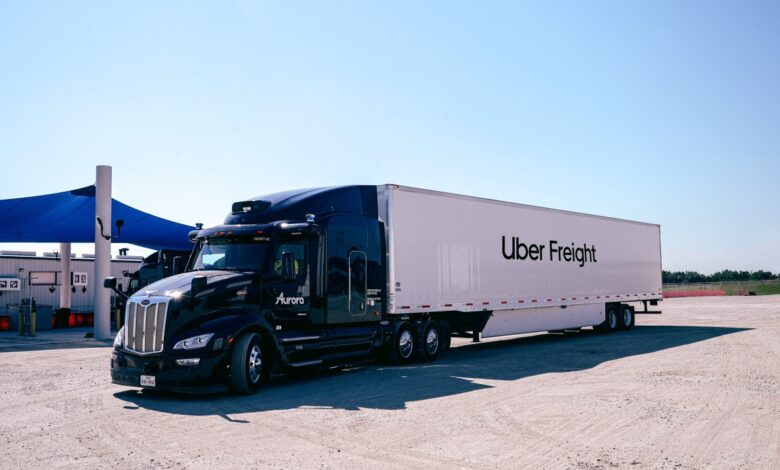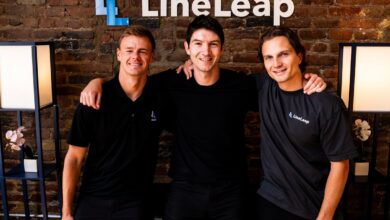Uber Freight and self driving trucks startup Aurora partner for the long haul

Uber Freight and Aurora Innovation have announced a multi-year collaboration that will see Aurora’s autonomous driving technology offered on the Uber Freight network through 2030.
The deal gives Aurora access to shipping customers as it prepares to launch its fully driverless commercial service later this year. It also helps Aurora also secure longer-term customers through Uber Freight’s network by going to where those customers already are. Uber Freight today manages around $18 billion worth of commercial freight for its shipping customers.
The partnership is an expansion of a previous drivered commercial pilot that saw Aurora hauling goods on the Uber Freight network between Dallas and Houston.
The tie-up comes amid a freight recession caused by a range of factors, including higher price of goods, lower customer demand and increased fuel costs. The resulting falling freight rates has caused thousands of trucking companies, including Jeff Bezos-backed Convoy, to shut down. Uber Freight has also taken a hit from the trend of lower revenue per load – its revenue in the first-quarter declined 8% year-over-year and was flat quarter-over-quarter.
The goal for Uber Freight, the logistics business spun out of Uber in 2018, is to connect its shipping customers with a technology that purports to solve many issues in trucking today, including labor shortages and underutilized fleets. Uber is also likely holding out for a return on its investment into Aurora in particular and self-driving technology in general.
Over the years, Uber has made a handful of bets into transportation, including autonomous vehicles via its self-driving unit Uber ATG. Despite selling Uber ATG to Aurora in 2020 in an effort to drop high capital expenditure projects and achieve profitability, Uber has managed to retain some stake AVs. As part of the complex deal, Uber handed over its equity in Uber ATG and invested $400 million into Aurora, giving it a 26% stake in the combined company.
In other words, Uber has a genuine stake in ensuring that both its freight business – which has also secured partnerships with self-driving trucking companies Waabi and Torc Robotics – and Aurora succeed.
The partnership between the two companies consists of multiple stages.
Aurora plans to launch a fully driverless commercial service by the end of 2024, and it will do so on the Uber Freight network via a Transportation-as-a-Service (TaaS) model. Aurora will own and operate a fleet of up to 20 trucks – produced by Paccar and Volvo – and appear as a carrier on the Uber Freight network which shippers can hire to haul freight.
Down the line, that relationship will shift to a Driver-as-a-Service (DaaS) model, wherein carriers purchase trucks with the Aurora Driver technology on board. Those carriers will then offer their services via those trucks to shippers on the Uber Freight network.
“The carrier will buy the AV truck from the OEM at whatever price they negotiate with the OEM provider, and [Aurora] will provide the Drivers,” Zac Andreoni, Aurora’s VP of business development, told TechCrunch. “[Carriers] will pay us rates commensurate with how they pay drivers today, obviously adjusted for the value that we’re providing.”
Andreoni noted that the DaaS product comes with Aurora maintenance and support, including access to the company’s command center with remote operators to help get trucks out of sticky situations and back on mission.
Aurora is still a couple years out from actually going to market with its DaaS model.
“The process to get any kind of fleet that wants to buy a truck will take anywhere between a year to a year and a half before they sign the final paperwork on the number of trucks they want to buy with whatever specs,” Olivia Hu, head of autonomous trucking at Uber Freight, told TechCrunch. “So the sales cycle is actually much longer than that.”
To get those customers lined up, Uber Freight and Aurora are launching this week a so-called Premier Autonomy program. The goal is to give carriers an early path to purchase and onboard the Aurora Driver so that when the assets are available for purchase, carriers know how to use them and their systems are appropriately integrated.
“We’re going to start by raising awareness, bringing fleets to the table, giving them a voice – especially the fleets on our network – and start designing what that needs to look like for them when [Aurora’s] ready to launch Driver-as-a-Service,” Hu said.
The timing of when DaaS goes to market also aligns with Aurora’s deal with automotive supplier Continental, which is slated to mass produce the company’s autonomous vehicle hardware kit by 2027.
Source link



